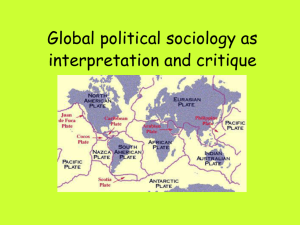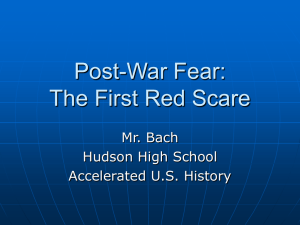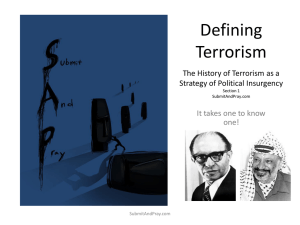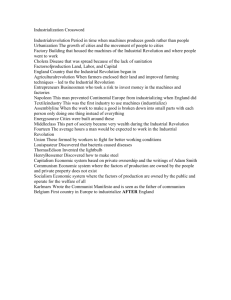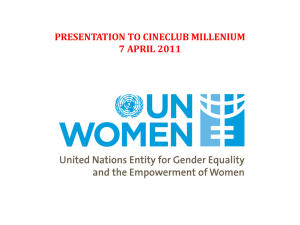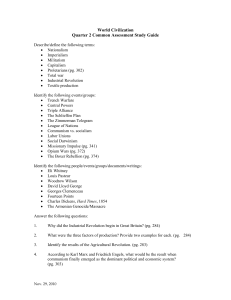Fall 2013 Textbook Notes (Prof. Clark)
advertisement
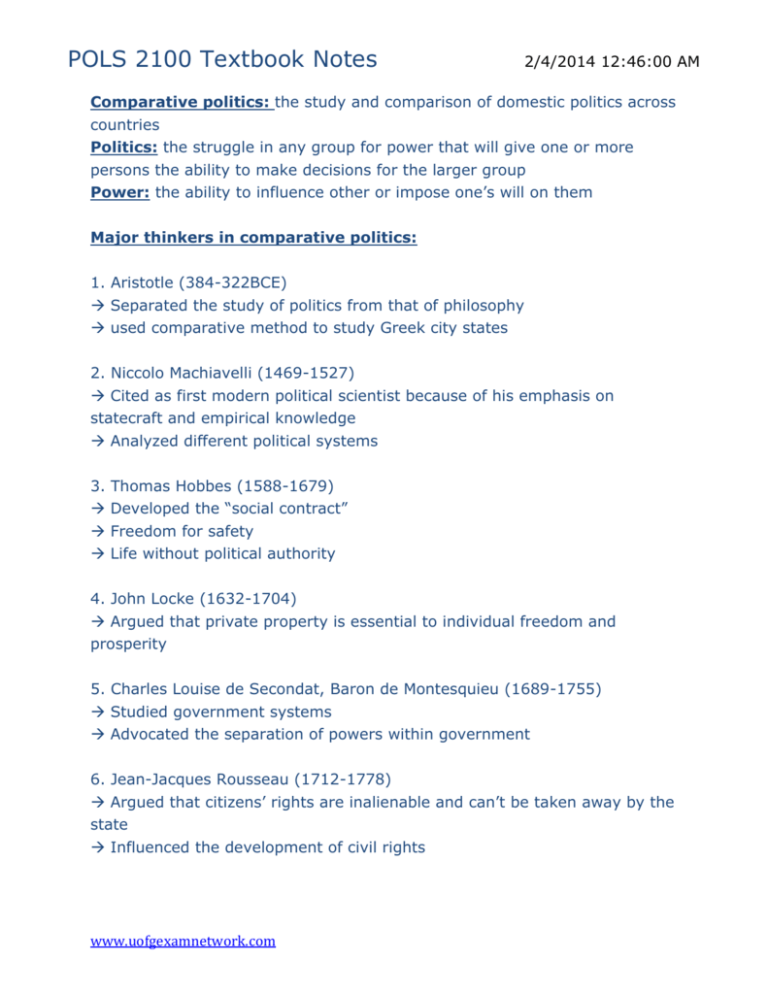
POLS 2100 Textbook Notes 2/4/2014 12:46:00 AM Comparative politics: the study and comparison of domestic politics across countries Politics: the struggle in any group for power that will give one or more persons the ability to make decisions for the larger group Power: the ability to influence other or impose one’s will on them Major thinkers in comparative politics: 1. Aristotle (384-322BCE) Separated the study of politics from that of philosophy used comparative method to study Greek city states 2. Niccolo Machiavelli (1469-1527) Cited as first modern political scientist because of his emphasis on statecraft and empirical knowledge Analyzed different political systems 3. Thomas Hobbes (1588-1679) Developed the “social contract” Freedom for safety Life without political authority 4. John Locke (1632-1704) Argued that private property is essential to individual freedom and prosperity 5. Charles Louise de Secondat, Baron de Montesquieu (1689-1755) Studied government systems Advocated the separation of powers within government 6. Jean-Jacques Rousseau (1712-1778) Argued that citizens’ rights are inalienable and can’t be taken away by the state Influenced the development of civil rights www.uofgexamnetwork.com 7. Karl Marx (1818-1883) Inequality in Das Kapital Predicted the eventual collapse of capitalism and democracy 8. Max Weber (1864-1920) Wrote on topics such as bureaucracy, forms of authority, and the impact of culture on economic and political development Traditional approach: emphasis on describing political systems and their various institutions Behavioral approach: the shift from a descriptive study of politics to one that emphasizes casualty, explanation, and prediction Chapter 2: States State: the organization that maintains a monopoly of violence over a territory Sovereignty: the ability to carry out actions and policies within a territory independent of external actors and internal rivals Regime: the fundamental rules and norms of politics Government: the leadership that runs the state, limited by the regime Consensus: individuals band together to protect themselves and create common rules: leadership chosen from among people, security through cooperation democratic rule Coercion: individuals are brought together by a ruler, who imposes authority and monopolizes power. Security through domination Authoritarian rule Types of legitimacy: 1. traditional legitimacy: built by habit and custom over time, stressing history; strongly institutionalized (ex. Monarch) 2. Charismatic legitimacy: built on the force of ideas and presence of the leader; weakly institutionalized (ex. Revolutionary hero) 3. Rational-legal legitimacy: built on rules and procedures and the offices that create and enforce those rules; strongly institutionalized (ex. Elected executive) Federalism: powers such as taxation, lawmaking, and security are devolved to regional bodies and to local legislatures that control specific territories within the country Asymmetric federalism: power is divided unevenly between regional bodies Unitary states: political power is concentrated at the national level, and local authority is limited *PAGE 49 CHART www.uofgexamnetwork.com Chapter 3: Nations and Society Ethnicity: we emphasize a person’s relation to other members of society Ethnic identity: a set of institutions that bind people together through a common culture. Often based on customs, language, religion, or other factors Nation: a group that desires self government through an independent state National identity: an institution that binds people together through common political aspirations Nationalism: a pride in one’s people and the belief that they have their own sovereign political destiny that is separate from others Citizenship: an individual’s relation to the state; the individual swears allegiance to the state, and the state in turn provides certain benefits or rights Nation-state: a sovereign state encompassing one dominant nation that it claims to embody and represent Ethnic conflict: conflict between ethnic groups that struggle to acheieve certain political or economic goals at each other’s expenses National conflict: seeks to gain sovereignty, clashing with one another over the quest to form an independent state Radicals: believe in dramatic, often revolutionary change of the existing political, social or economic order Ideologies: 1. Liberalism: favors a limited state role in society and economic activity; emphasizes a high degree of personal freedom over social equality (conservative) 2. Communism: emphasizes limited personal freedom and a strong state in order to achieve social equality; property is wholly owned by the state and market forces are eliminated; state takes on task of production and other economic decisions (radical) 3. Social democracy: supports private property and markets but believes that state has a strong role to play in regulating the economy and providing benefits to the public; seeks to balance freedom and equality (liberal) www.uofgexamnetwork.com 4. fascism: stresses a low degree of both personal freedom and equality in order to achieve a powerful state (reactionary) 5 anarchism: stresses the elimination of the state and private property as a way to achieve both freedom and equality for all; believes that a high degree of person freedom and social equality is possible (radical) Chapter 4: Political Economy Political economy: the study of how politics and economics are related and how their relationship shapes the balance between freedom and equality Markets: the interactions between the forces of supply and demand, and they allocate resources through the process of those interactions sellers seek to create products that will be in demand buyers seek to buy the best or most goods at the lowest price markets are the medium through which buyers and sellers exchange goods markets emerge spontaneously and aren’t easily controlled by the state Property: the ownership of the goods and services exchanged through markets land, buildings, businesses or personal items Public goods: goods provided or secured by the state, that are available for society and indivisible, meaning that no one private person or organization can own them Social expenditures: the state’s provision of public benefits, such as education, health care and transportation Central bank: an institution that controls how much money is flowing through the economy, as well as how much it costs to borrow money in that economy controls the amount of money in an economy controls the cost of borrowing money lowers interest rates to stimulate the economy raises interest rates to check inflation Inflation: an increase in the overall prices in the economy (also deflation) Hyperinflation: inflation that is higher than 50% a month for more than 2 months in a row Tariffs: taxes on imported goods Quotas: limit the quantity of a good coming into the country www.uofgexamnetwork.com Arguments over the regulation of trade: Why regulate trade? - To generate state revenue - To foster local industry - To protect local jobs - To keep wealth in the country - Why not? To promote competition - To keep the costs of goods low To stimulate domestic innovation in areas of comparative advantage Political economic system: the actual relationship between political and economic institutions in a particular country, as well as the policies and outcomes they create Laissez faire: let do Capitalism: a system of private property and free markets How do social democracies seek to achieve greater equality? - Through taxes, which make high levels of social expenditure possible while redistributing wealth from rich to poor - Through trade, which is promoted but balanced with preserving domestic industry and jobs - Through government regulation and even ownership of important sectors of the economy Contributors to the theories of political economy: Liberalism: The wealth of nations, considered one of the first texts on modern economics. Articulated the idea that economic development requires limited government interference – Adam Smith Mercantilism: Nation system of political economy rejected free-trade theories of liberalism, arguing that states must play a strong role in protecting and developing the national economy against foreign competitors – Friedrich List Communism: Das Kapital, asserted that human history is driven by economic relations and inequality and that revolution will eventually replace capitalism with a system of total equality among people – Karl Marx Social democracy: Evolutionary Socialism, Rejected Marx’s belief in the inevitability of revolution, arguing that economic equality can be achieved through democratic participation – Edward Bernstein How do mercantilist states seek to achieve economic power? - By directing the economy toward certain industries and away from others through the use of subsidies and taxation - Through partial or full state ownership of industries that are considered critical - With the strong use of tariffs, nontariff barriers, and other regulations - By limiting social expenditures and thereby keeping taxation to a minimum - With low interest rates set by the central bank to encourage borrowing and investment GDP: measures total production within a country, regardless of who owns the products PPP: takes cost of living and buying power into account GINI: assess inequality HDI: assess health, education and wealth of the population Liberalization: cutting taxes, reducing regulation, privatizing state owned businesses and public goods and expanding property rights Chapter 6: Nondemocratic Regimes Nondemocratic Regime: a political regime is controlled by a small group of individuals who exercise power over the state without being constitutionally responsible to the public a small group of individuals exercises power over the state government isn’t constitutionally responsible to the public public has little or no role in selecting leaders individual freedom is restricted nondemocratic regimes may be institutionalized and legitimate Totalitarianism: a form of nondemocratic rule with a highly centralized state whose regime has a well defined ideology and seeks to transform and fuse the institutions of state, society and the economy seeks to control and transform all aspects of the state, society and economy use violence as a tool for remaking institutions have a strong ideological goal have arisen relatively rarely Populism: a specific ideology and in fact draws much of its power from an anti institution approach Nondemocratic means of control: - Coercion public obedience is enforced through violence and surveillance - Co-optation: members of the public are brought into a beneficial relationship with the state and government - Personality cult: the public is encouraged to obey the leader based on his/her extraordinary qualities and compelling ideas Corporatism: emerged as a method by which nondemocratic regimes attempted to solidify their control over the public by creating a limited number of organizations to represent the interests of the public and restricting those not set up or approved by the state Clientelism: where the state co-opts members of the public by providing specific benefits to a person in return for public support ex. Voting www.uofgexamnetwork.com Kleptocracy: those in power seek only to drain the state of assets and resources Patrimonialism: an arrangement where the ruler depends on a collection of supporters within the state who gain direct benefits in return for enforcing the ruler’s will Bureaucratic Authoritarianism: a regime in which the state bureaucracy and the military share a belief that a technocratic leadership, focused on rational, objective and technical expertise, can solve the problems of the country – unlike emotional or irrational ideology based parties Types of nondemocratic rule: 1. Personal and monarchial rule: rule by a single leader with no clear regime or rules constraining that leadership 2. Military rule: rule by one or more military officials, often brought to power through a coup detat 3. One party rule: rule by one political party, with other groups banned or excluded from power 4. Theocracy: rule by god: holy texts serve as foundation for regime and politics 5. illiberal regimes: rule by an elected leadership, through procedures of questionable democratic legitimacy Political Violence Political Violence: politically motivated violence outside of state control ex. Revolutions, civil wars, riots and strikes 3 Explanations for political violence 1. Institutional: Existing institutions may encourage violence or constrain human action, creating a violent backlash ex. Presidentialism 2. Ideational: Ideas may justify or promote the use of violence ex. Some forms of religious fundamentalism; nationalism 3. Individual: Psychological or strategic factors may lead people to carry out violence ex. Humiliation 2 Forms of political violence 1. Revolution: an uprising of the masses, who take to the streets, seize control of the state, and depose the old regime a public seizure of the state in order to overturn the existing government and regime 2. Terrorism: much more secret and hidden, a conspiratorial action carried out by a small group the use of violence by non state actors against civilians to achieve a political goal Relative deprivation model: according to this model, revolutions are less a function of specific conditions than of the gap between actual conditions and public expectations it isn’t absolute conditions that instigate revolution but rather how the public perceives them State sponsored terrorism: terrorism supported directly by state as an instrument of foreign policy www.uofgexamnetwork.com Shifting Views of Revolution Phase Approach Criticisms First: Pre - world War II Studies of Revolutionary Unsystematic and events descriptive Second: Post - World War II Behavioral Revolution Studies of disruptive change, such as modernization, as driving revolutionary action Not clear why change or rising discontent leads to revolution in some cases and not others Third: 1970s present Studies of domestic and international state power as providing the opening for revolution Too focused on institutions, to the neglect of ideas and individual actors Guerrilla War: involves non-state combatants who largely accept traditional rules of war and target the state rather than civilians Nihilism: a belief that all institutions and values are essentially meaningless and that the only redeeming value on can embrace is violence Violence is desirable for its own sake Regime Type and Terrorism Regime Type Effect on Terrorism Result Risk of Terrorism Authoritarian Authoritarian may foster terrorism, but the state can repress Limited terrorism, but may be redirected outside of the Lower domestic country toward terrorists; the state is unhindered by civil liberties more vulnerable targets Participatory institutions and civil liberties are likely to Domestic terrorism less likely, but country may be undercut public support for terrorism a target of international terrorism generated in nondemocratic regimes Democratic Illiberal/Transitional Weak state capacity, instability, and limited democratic institutions may generate both opportunities and motivations for terrorism Terrorism more likely, with domestic and/or international support Moderate Higher Advanced Democracies Political Diversity in Advanced Democracies: 1. Participation: - Standards of voter eligibility digger - referenda and initiatives are used in varying degrees - some states automatically register all eligible voters - voting is compulsory in some nations, but voluntary in most 2. Competition: - different methods and levels of funding are used for political parties and campaigns - separation of powers varies greatly and is based primarily on the relative strength of different branches of government 3. Liberties: - distinctions exist in the regulation, allowance, or prohibition of activities such as abortion, prostitution, and hate speech - different degrees of individual privacy are protected from state and corporate intrusion Supranational system: where sovereignty is shared between the member states and the EU Means of Devolution: - transfer of policy making responsibility to lower levels of government - creation of new political institutions at lower levels of government - transfer of funds and powers to tax to lower levels of government, affording them more control over how resources are distributed www.uofgexamnetwork.com Communism and Post communism 2/4/2014 12:46:00 AM Communism: a set of ideas that view political, social, and economic institutions in a manner fundamentally different from political thought Terms in Marxist Theory 1. Surplus value of labour: the value invested in any human made good that can be used by another individual. Exploitation results when one person or group extracts the surplus value from another 2. Base: the economic system of a society, made up of technology and class relations between people 3. Superstructure: all noneconomic institutions in a society. These ideas and values derive from the base and serve to legitimize the current system of exploitation 4. False consciousness: failure to understand the nature of one’s exploitation 5. Dialectical materialism: process of historical change that is not evolutionary but revolutionary. The existing base and superstructure would come into conflict with new technological innovations, generating growing opposition to the existing order. 6. Dictatorship of the proletariat: temporary period after capitalism has been overthrown during which vestiges of the old base and superstructure are eradicated 7. proletariat: the working class 8. Bourgeoisie: the property owning class 9. Communism: state and politics would disappear, and society and the economy would be based on equality and cooperation 10. Vanguard of the proletariat: that an elite communist party would have to carry out revolution, because as a result of the false consciousness, historical conditions would not automatically lead to capitalism’s demise Important figures in communism - Karl Marx: first philosopher to construct a theory explaining why capitalism would fail and be replaced by communism www.uofgexamnetwork.com - Lenin: Applied Marxist thought to Russia. Modified Marxist ideas by arguing that revolution would occur in struggling countries - Stalin: embarked on rapid industrialization of the country, modifying Marxism to argue that socialism could be built within just a single country - Mao Zedong: led the Chinese communist party and fought against Chinese rivals and Japanese occupiers during WWII. Modified communism to focus on the peasantry instead of the working class - Deng Xiaoping: fought with Mao Zedong against Chinese nationalists and Japanese occupiers during WWII . Pursued economic liberalization in the 1980’s and supported repression of the Tiananmen square protest - Fidel Castro: led the Cuban revolution in 1959 and defended the communist system against anticommunist forces and US opposition; continues to defend Cuban socialism in spite of the collapse of the Soviet Union and other communist regimes in Eastern Europe - Mikhail Gorbachev: general secretary of the communist party of the Soviet Union in 1985, initiated the twin policies of economic restructuring and political liberalization Politburo: political bureau Communist political economy: - markets and property are wholly absorbed by the state - central planning replaces the market mechanism - individual property, profit, unemployment, competition, are eliminated - the state provides extensive public goods and social services Societal institutions under communism 1. Ideal - Religion, the opiate of the masses will disappear - men and women will be economically, socially, and politically equal - repressive institutions such as marriage will be replaced by an openly legalized system of free love - nationalism, exposed as part of the elite’s divide and conquer strategy will be eliminated 2. Reality - religion was suppressed but not eliminated - opportunities for women increased, but women were still expected to fulfill traditional duties in the home - many communist countries remained very sexually conservative - though discouraged from doing so, people clung to old national and ethnic identities Privatization: the transfer of state-held property into private hands Marketization: the recreation of the market forces of supply and demand Shock therapy: rapid market reforms that would free prices and being an end to central planning and state subsidies for business overnight Less Developed and Newly Industrializing Countries Newly Industrialized Country: A historically less developed country that has experienced significant economic growth and democratization Less developed country: A country that lacks significant economic development or political institutionalization or both Imperialism: where a state extends its power to directly control territory, resources, and people beyond its borders - Was propagated by European powers from the 16th – 21st C - Is driven by economic, strategic, and religious motives - Often led to colonialism, the physical occupation of foreign territories Colonialism: a greater degree of the physical occupation of a foreign territory through military force, business, or settlers Political and Social institutions of imperialism: - The state, as a form of political organization, was imposed on much of the world outside of Europe - Ethnic and national identities were created where none had existed before colonization - Gender roles from the imperial country were often imposed on colonies Economic institutions of imperialism: - Traditional agricultural economies were transformed to suit the needs of the imperialist power - Economic organization under imperialism impeded domestic developed in the economies - Free trade was often suppressed as colonies were forced to supply goods only to the imperial country, creating extractive economies in the colonies Challenges to building state autonomy and capacity in less developed countries: - Absence of professional bureaucracy - Clientelism, rent seeking, and corruption in the handling of state jobs and revenue - Sovereignty often comprised by external actions www.uofgexamnetwork.com Challenges to building a unified nation state: - Ethnic and religious divisions among different groups in heterogeneous societies - Arbitrary political boundaries imposed by imperial powers Import substitution: countries restrict imports, raising tariff or nontariff barriers to spur demand for local alternatives Export oriented industrialization: sought out technologies and developed industries that were focused specifically on export, capitalizing on what is known as the “product life cycle” Three paths to Economic Growth: 1. Import substitution: - Based on mercantilism - State plays a strong role in the economy - Tariff or nontariff barriers are used to restrict imports - State actively promotes domestic production, sometimes creating state owned businesses in developed industries - Criticized for creating “hothouse economies” with large industries reliant on the state for support and unable to compete in the international market 2. Export oriented industrialization: - Based on mercantilism - State plays a strong role in the economy - Tariff barriers used to protect domestic industries - Economic production is focused on industries that have a niche in the international market - Seeks to integrate directly into the global economy - Has generally led to a higher level of economic development that import substitution 3. Structural adjustment - Based on liberalism - State involvement is reduced as the economy is opened up - Foreign investment is encouraged - Often follows import substitution - Criticized as a tool of neocolonialism and for its failure in many cases to bring substantial economic development Globalization and the Future of Comparative Politics Globalization: linkages between states, societies, and economies appear to be intensifying, and at an increasingly rapid pace, challenging long standing institutions, assumptions and norms Multinational corporation (MNC): firms that produce, distribute, and market goods and services in more than one century ex. Microsoft Nongovernmental organizations (NGO): national and international groups that are independent of any state and pursue policy objectives and foster public participation ex. Greenpeace, Red Cross Intergovernmental organizations (IGO): groups created by states to serve the EU, and the organization of American states ex. UN, EU International regime: link states together through rules and norms that shape their relationships to one another, usually regarding some specific issue (such as greenhouse gases or trade) Bretton Woods System: was created to manage international economic relations, whose inability was commonly cites as a driving force behind the great depression and WWII www.uofgexamnetwork.com
